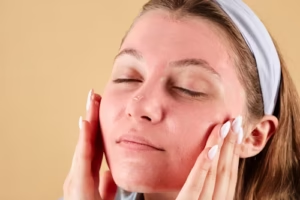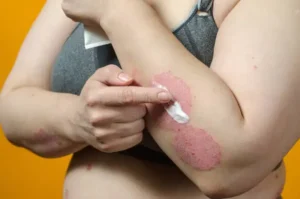Dealing with psoriasis on your face can be frustrating, uncomfortable, and even embarrassing at times. Your face is front and center—it’s how the world sees you. When red, scaly patches start showing up on your cheeks, eyebrows, or forehead, it’s natural to want fast relief. The good news? There are safe and effective over-the-counter (OTC) solutions and natural tips you can try at home that make a real difference. Psoriasis Treatment for Face
Let’s break down everything you need to know to manage facial psoriasis and reclaim your glow, without harsh treatments.
Understanding Facial Psoriasis
What Is Facial Psoriasis?
Facial psoriasis is a chronic autoimmune skin condition that causes red, inflamed, and often flaky patches to form on areas of the face. Unlike regular dry skin or eczema, psoriasis tends to be thicker, more defined, and often comes with silvery scales. Psoriasis Treatment for Face
Causes of Psoriasis on the Face
While the exact cause of psoriasis isn’t fully understood, it’s believed to be linked to an overactive immune system. Genetics, environmental triggers, stress, and lifestyle factors all play a role. Flare-ups can be triggered by weather changes, certain skincare products, infections, or even emotional stress.
Is Facial Psoriasis Different from Other Types?
Yes. The facial skin is more delicate, making treatment trickier. You can’t just slap on the same creams you’d use on your elbows or knees. The face requires gentler, non-irritating formulas.
Signs and Symptoms to Watch Out For
Common Facial Psoriasis Areas
Hairline and forehead
Around the eyebrows
Nasolabial folds (sides of the nose)
Eyelids and under the eyes
Symptoms That May Be Mistaken for Other Conditions
Flaking that looks like dandruff
Redness mistaken for rosacea
Itchiness that mimics eczema
Can You Treat Facial Psoriasis at Home?
When to See a Dermatologist
If the symptoms are severe, painful, or spreading fast, it’s time to consult a professional. But for mild to moderate cases, at-home care with OTC treatments can be very effective.
Risks of DIY Treatments
Not all home remedies are safe for the face. For example, high-concentration essential oils or strong acids can burn sensitive skin and worsen symptoms. Always do a patch test first.
Best Over-the-Counter (OTC) Treatments for Facial Psoriasis
Topical Corticosteroids (Low-Strength)
Hydrocortisone 1% is a mild steroid available without a prescription. It helps reduce redness and inflammation, but should only be used short-term on the face to avoid thinning the skin.
Salicylic Acid Products
This exfoliant helps slough off dead skin cells and soften plaques. Look for low-concentration (1-2%) products specially made for facial use.
Coal Tar Creams
While smelly and not the most glamorous, coal tar can slow skin cell growth. Go for a facial-safe formula like Neutrogena T/Gel or Psoriasis.
OTC Moisturizers with Ceramides
Dry skin worsens psoriasis. Use gentle moisturizers with ceramides and glycerin to repair the skin barrier. Brands like CeraVe and Eucerin are good options. Psoriasis Treatment for Face
At-Home Skincare Routine for Psoriasis-Prone Skin
Step-by-Step Gentle Skincare Routine
Cleanse with a fragrance-free, non-foaming cleanser.
Pat dry (don’t rub) with a soft towel.
Apply a calming moisturizer immediately.
Use OTC treatments like hydrocortisone as directed.
Finish with SPF—sunburn can trigger flare-ups.
Best Facial Cleansers for Psoriasis
CeraVe Hydrating Cleanser
Vanicream Gentle Facial Cleanser
La Roche-Posay Toleriane
Ingredients to Avoid in Skincare Products
Fragrance
Alcohol
Menthol or camphor
Harsh exfoliants
Natural Remedies for Facial Psoriasis
Aloe Vera Gel
A cooling anti-inflammatory straight from nature. Use pure aloe (store-bought or from the plant).
Coconut Oil
Great as a nighttime moisturizer. It reduces dryness and calms itching.
Apple Cider Vinegar (Diluted)
It can help rebalance skin pH and reduce flakes—just be sure to dilute it and avoid any broken skin areas.
Oatmeal Masks
Colloidal oatmeal soothes inflamed skin. Use as a mask or add to lukewarm water for a compress.

Lifestyle Tips to Manage Facial Psoriasis
Managing Triggers
Avoid hot showers
Ditch harsh skincare
Switch to hypoallergenic pillowcases
The Role of Diet in Skin Health
Omega-3s, antioxidants, and anti-inflammatory foods (think salmon, spinach, berries) may reduce flare-ups. Avoid alcohol and processed foods.
Stress and Psoriasis Connection
Mind-body practices like yoga, deep breathing, and journaling can make a huge difference.
When OTC Isn’t Enough
Prescription Options
Dermatologists may prescribe calcineurin inhibitors (like tacrolimus), vitamin D analogs, or stronger corticosteroids for short-term use.
Phototherapy for Facial Psoriasis
Light therapy using controlled UVB light can help calm inflammation. It must be done professionally—don’t try tanning beds.
Psoriasis in Sensitive Areas: Eyes, Eyebrows, and Hairline
Tips for Treating Around Eyes and Eyelids
Use only treatments prescribed or recommended by a dermatologist. The skin here is ultra-thin.
Safe Options for Hairline Psoriasis
Use gentle medicated shampoos like T/Gel or MG217 and apply moisturizing creams around the edges of your hairline.
Makeup Tips for Psoriasis on the Face
Choosing Psoriasis-Safe Makeup
Mineral-based powders
Hypoallergenic formulas
Avoid heavy, oily products
Application Techniques That Won’t Irritate
Always prep with a moisturizer
Use brushes, not fingers
Remove makeup gently before bed
Dealing with the Emotional Side of Facial Psoriasis
Building Confidence with Psoriasis
You’re more than your skin. Build confidence through self-care, affirmations, and connecting with people who understand.
Support Groups and Online Communities
You’re not alone. Join groups on Reddit, Facebook, or look into the National Psoriasis Foundation.
Prevention: Keeping Flare-Ups at Bay
Daily Habits to Reduce Recurrence
Stay moisturized
Stick to a routine
Use sunscreen
Seasonal Psoriasis Tips
Winter brings dryness, so be sure to moisturize more. Summer means heat and sweat, so use light, breathable products.
Myths About Psoriasis Treatments
Common Misconceptions
“Psoriasis is contagious” – False
“Only harsh meds work” – Not true
“It’ll go away with age.” – It’s chronic, but manageable

What Works
Consistency. Treat your skin like a fragile plant—daily care, sunlight, hydration, and patience.
Conclusion
Facial psoriasis may feel like a never-ending struggle, but with the right over-the-counter treatments and at-home care, you can take control. From gentle skincare to smart lifestyle changes, every small habit adds up. Stay kind to your skin, and remember: healing starts with patience and knowledge. Psoriasis Treatment for Face
FAQs
Can facial psoriasis go away completely?
It can go into remission, but since it’s a chronic condition, it might return. Proper care helps keep it under control.
What’s the best OTC cream for facial psoriasis?
Hydrocortisone 1% and CeraVe Moisturizing Cream are two of the most gentle and effective options.
Is Vaseline good for psoriasis on the face?
Yes, it’s a great occlusive that locks in moisture, especially overnight.
Can makeup make facial psoriasis worse?
If you use the wrong products, yes. Stick to fragrance-free, non-comedogenic makeup.
How long does it take to see results with OTC treatments?
Usually within 1–2 weeks, but consistency is key.

